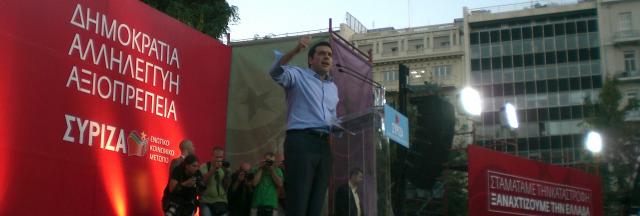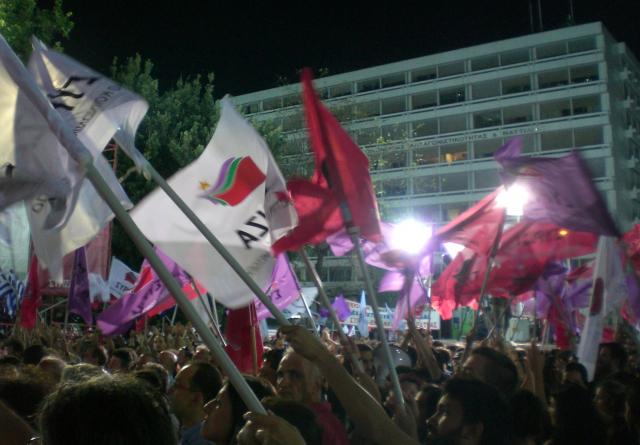Victoria Mindova
The Supreme Administrative Court has decided that the national TV and radio broadcaster ERT and its regional branches shall resume work until the new reformed media NERIT is ready to start broadcasting.
This news marks the end of the information blackout that covered Greece last week. It responds to the decision of Antonis Samaras’ coalition government to suddenly shut down the national television and radio stations in order to reform them.
The drama related to the national broadcaster has provoked serious political conflicts both within the government and outside it. On the day of the meeting of the government coalition partners, namely Antonis Samaras of New Democracy, Evangelos Venizelos of PASOK and Fotis Kouvelis of Democratic Left, SYRIZA had organized an opposition protest in Syntagma.
"Mr. Samaras, you are done! It is time for you to go!" said in Syntagma Alexis Tsipras, leader of the radical left, who, then more than ever, was full of confidence and self-esteem. He called the reform of ERT fireworks and a coup against democracy in the country.
"Samaras believes that he is Greece’s great Napoleon but he was not ready for Waterloo, which the employees of ERT had prepared for him." According to Tsipras, a year after its formation, the coalition government has to go away to make room for the left forces to govern the country.
"The forced closure of ERT was a coup against democracy and showed the true face of Samaras. The time has come to overthrow this government," cried Alexis Tsipras from the rostrum.
"We are ready to rule, we want to do so and we will rule soon," vowed the left leader, urging the citizens of Greece to support the overthrow of the coalition government.
"We are ready to rule, we want to do so and we will rule soon," vowed the left leader, urging the citizens of Greece to support the overthrow of the coalition government and the establishment of a government of left-wing forces. Tsipras uttered a threat to the German chancellor, "Mrs. Merkel, it is over with your representative. He is no longer able to rule nor to intimidate or reform."
Tsipras said that the broadcasts of ERT had been purposefully interrupted at a time when the colonists in the face of the supervisory Troika had come to plunder the country. He once again opposed the privatizations, fiscal consolidation and layoffs in the public sector.
He had openly demonstrated his ambitions to govern and insisted that a year ago, during the early parliamentary elections, Greece had lost a great opportunity for a change.

"They said that jobs would have been lost if SYRIZA had come to power. When they (the coalition government of New Democracy, PASOK and Democratic Left) came to power, they had already had a plan for thousands of layoffs and shocking unemployment. They said that if we were in power, bank deposits would be lost but they themselves were ready to accept everything, including cuts of deposits like in Cyprus. They threatened that if SYRIZA had come to power, the economy would have collapsed but they have signed additional measures that have increased the recession."
The leader of the radical left insisted that the current crisis had been caused by the old political system. According to him, the unilateral decision to close ERT is indicative of the lack of a government plan and SYRIZA is the only political force that can unite the left block and revive Greece.
There is no clear picture of the dividends that the opposition is drawing from the unexpected decision to interrupt the national radio and television broadcasts. However, the party is trying to capitalize on the situation as much as it can.
The people in Syntagma Square shouted and applauded in delight, chanting, "No Venizelos, no Samaras, we want a government of the left."
 "Give up the country's wealth and leave," Tsipras was crying persistently. He defined the reform of ERT as the beginning of the end of the three-party government.
"Give up the country's wealth and leave," Tsipras was crying persistently. He defined the reform of ERT as the beginning of the end of the three-party government.
"ERT will be Samaras’ swansong. We are coming," he predicted, saying that the first reform which Greece needs is for the present government to leave. He called today's Prime Minister Antonis Samaras dangerous for democracy.
Without giving a clear explanation of how he would finance his generous promises of higher wages, health care for all and jobs for the unemployed, Tsipras announced that there would be nationalizations, increased pensions and that the minimum wage would be restored to pre-crisis levels (760 euro net per month). "When we come to power, we will put an end to the endless vilification of public administration," he added.
The meeting of the coalition government partners ended about an hour after the rally of SYRIZA. Venizelos and Kouvelis have clearly expressed their disagreement with the decision of New Democracy to shut down the national broadcaster but have not opposed the reform of ERT.
"The decision of the Supreme Administrative Court confirms what I had said in the beginning. No government can deprive the nation of the broadcasts of the state television and impose the interruption of ERT, RIK (the Cypriot TV) and Euronews. The national broadcaster should be reformed but no darkness should fall on public awareness," said Evangelos Venizelos, leader of PASOK, after the meeting in the Prime Minister’s office. The statement of Fotis Kouvelis, who heads Democratic Left, was in the same vein. Both of them defined the interruption of the broadcaster as Samaras’ unilateral decision and expressed the need to restructure the cabinet.